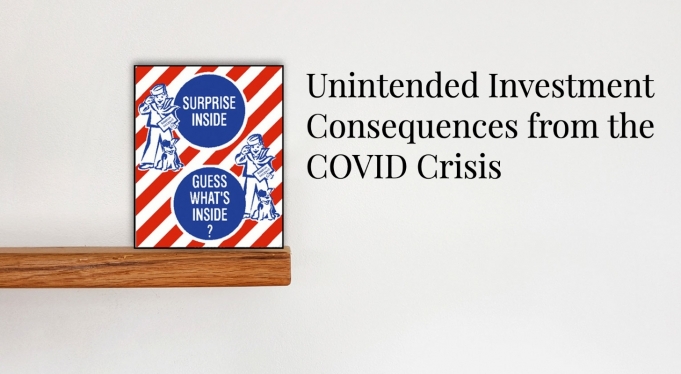A few weeks back we took a look at some trends this crisis has likely set in motion, accelerated and other ‘generally accepted’ trends that we think are overblown. This was looking at the direct impacts we may or may not see from COVID from a finance perspective. Now, we want to consider what might be some second order effects stemming from this crisis and how they might impact investor behaviour.
Looking more at the response to the crisis, these are what we see as some very notable takeaways. Please keep in mind, we are not commenting on politics or whether any policy decision was right or wrong. We are simply observing what has happened.
Central Bank Put
The term ‘put’ refers to an option to sell a security at a pre-specified price. This essentially puts a ‘floor’ on an asset value. This is what we mean when using the term ‘put’. The implication being that central banks and governments may have essentially put an unofficial floor on economic or financial markets.
What was interesting was not that just a single central bank acted aggressively in this crisis. Almost every central bank across the globe stepped up to help ensure markets functioned properly. Not only did they act quickly but they acted aggressively. The idea being if it is not enough, you might as well not bother at all and in turn err on the side of doing ‘too much’. It is clear that central banks took some key lessons from 2008 .
Political Put
What is a bit different in this crisis compared to 2008, from a policy response perspective, is that federal and local governments have also stepped up in a big way to support the economy and get cash in the hands of those who need it most. It is hard to view this as anything other than the right thing to do. However, if these efforts work out (and it hopefully looks like it is working to some degree), this could also introduce some interesting philosophical implications.
The responses of both governments and central banks is interesting and raise a few questions that have implications for investors. We get pretty philosophical here and provide no answers to the questions but stay with us.
How do we define a crisis?
When does a crisis become a crisis and how do we decide which crises deserve support and which ones don’t? If the economy crashes due to excessive borrowing, do we expect governments to step in? Or is a crisis only fought by the institutions when it is an exogenous issue such as a virus or meteor? Does it matter what caused the crisis, or is the fact that people are suffering in some form or fashion all that matters? These answers have important implications on how risky investing in a broad sense is and in turn what people are willing to pay for an asset. Understanding what a ‘crisis’ is will be important because society will almost certainly look to this current crisis as a precedent or template when the next one happens.
How quick and aggressive of a response is appropriate?
One interesting second order impact could be if the response to COVID sets a precedent where governments decide the better course of action is to shoot first with all they have and ask questions later. Let’s say we have the butterfly invasion of 2030 and a government acts quickly to stop this threat before we have seen much of an impact. Regardless of whether the action was justified by the threat, a government can declare mission accomplished and say it would have been way worse if they did not act. Put another way, what incentive does a government have to not act quickly and aggressively to stop any perceived threat in its tracks? Maybe this is actually the job of a government and we entrust them to weight these pros and cons appropriately? Regardless, the speed and degree of a response to future crises also has implications on how risky investing is.
*Just to be clear, I am in no way insinuating COVID is a ‘butterfly crisis’ but suggesting the response to COVID has potential to set a precedent for responses in other matters that may or may not be appropriate.
Will society and governments have a newfound love for large companies?
Prior to COVID, one of the largest risks facing FANG names in our view has been that of regulatory intervention. Given that society has been able to continue to function through this pandemic in large part because of these large companies must place them in a better light post-COVID. This might create a newfound appreciation for large companies and neutralize one of the larger risks standing in their way.
Of course, there’s no concrete answer in the above questions, nor is it simply a binary answer. Further, what ends up being true can be less important than what ‘the market’ believes to be true. If the market thinks that governments across the world are going to do what they can to support economies and the markets going forward, this would have a big impact on how an investor views risk when investing in equities. In the future, governments may or may not be there to help out and there could be larger unintended consequences down the road because of such action. BUT, if the market views this type of support as lowering the risk in equities, this has big implications on valuations across the board. Put another way, should an investor begin to think that governments and other institutions will/should do all they can to neutralize future recessions? Whether or not they are always successful in doing so, should this backstop not almost certainly lower the overall risk in equities compared to history?
All of the above essentially comes down to whether the overall risk in equities is being lowered. If this is the case, lower risk means an investor is willing to accept lower returns. These lower returns are reflected in stock prices through higher valuations. No one knows what markets are going to do in the short-term but post-COVID, if you thought markets looked expensive before, you might want to buckle up.
Take Care,
![]()
Are you looking for more of this? Are you thinking about becoming a 5i Research Member? There is no better time to join but don't just take our word for it. Try it for FREE for the next month and experience all the benefits of the 5i Research membership. (And don't worry. We won't ask for your credit card upfront)







Comments
Login to post a comment.
To be sure.....You mean markets will look more expensive post virus?